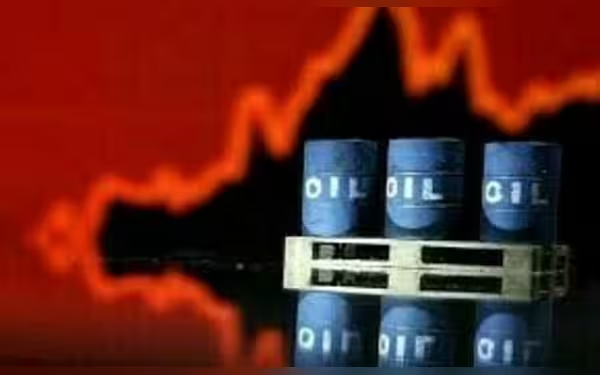Saturday, November 16, 2024 05:40 PM
Oil Prices Decline Amid Middle East Tensions and Hurricane Impact
- Oil prices decline as investors eye Middle East tensions.
- Hurricane Milton disrupts Florida's fuel supply.
- Geopolitical risks keep oil market on edge.
 Image Credits: brecorder
Image Credits: brecorderOil prices ease as investors remain cautious over Middle East tensions and Hurricane Milton's impact on fuel supply.
Oil prices have recently shown a slight decline, yet they are still on track for a second consecutive week of gains. This fluctuation comes as investors remain cautious about potential supply disruptions in the Middle East, particularly if Israel decides to target Iranian oil facilities. The backdrop of this situation is complex, involving geopolitical tensions and natural disasters that could impact oil supply and prices.
As of Friday, Brent crude oil futures were down by 20 cents, or 0.25%, settling at $79.20 a barrel. Meanwhile, U.S. West Texas Intermediate crude futures saw a decrease of 13 cents, or 0.17%, bringing the price to $75.72 per barrel. The market is currently feeling the weight of uncertainty, especially as Israel considers its response to a significant missile attack from Iran. Tim Snyder, the chief economist at Matador Economics, noted that if Israel were to strike Iran’s oil and gas infrastructure, it could lead to a surge in oil prices.
In addition to geopolitical tensions, Hurricane Milton has also played a role in the oil market dynamics. The hurricane made landfall in Florida, causing destruction and resulting in at least 10 fatalities, while leaving millions without power. Florida, being the third-largest gasoline consumer in the U.S., relies heavily on waterborne imports for its fuel supply, as it lacks refineries. The aftermath of the hurricane could potentially dampen fuel consumption, adding another layer of complexity to the oil market.
Concerns over high crude inventories and the possibility of a more gradual monetary easing by the U.S. Federal Reserve have also contributed to the recent pause in the rally of oil prices. This month, crude benchmarks experienced a spike following Iran's launch of over 180 missiles against Israel on October 1, raising fears of retaliation against Iranian oil facilities. Although Israel has not yet responded, the oil market remains on edge, with analysts suggesting that a risk premium will persist until a clear response is observed.
Israeli Defence Minister Yoav Gallant has indicated that any potential strike against Iran would be “lethal, precise and surprising.” This statement underscores the seriousness of the situation and the potential for escalation. Iran, for its part, supports various groups that are in conflict with Israel, including Hezbollah in Lebanon and Hamas in Gaza, which adds to the volatility of the region.
In a related development, the Lebanese army reported that two individuals were killed and three others injured due to Israeli forces targeting a military post in southern Lebanon. Meanwhile, Gulf states are urging Washington to intervene and prevent Israel from attacking Iranian oil sites, fearing that their own oil facilities could be at risk if the conflict escalates further.
On the supply side, Libya’s national oil corporation announced that it has restored oil production to pre-crisis levels, reaching 1.25 million barrels. This restoration is a positive sign for the global oil supply, but the overall market remains sensitive to geopolitical developments.
The current state of the oil market is a reflection of both natural and man-made challenges. Investors are advised to stay informed about the evolving situation in the Middle East, as any significant developments could have far-reaching implications for oil prices and global supply. As the world watches closely, the interplay between geopolitical tensions and natural disasters will continue to shape the landscape of the oil market.













